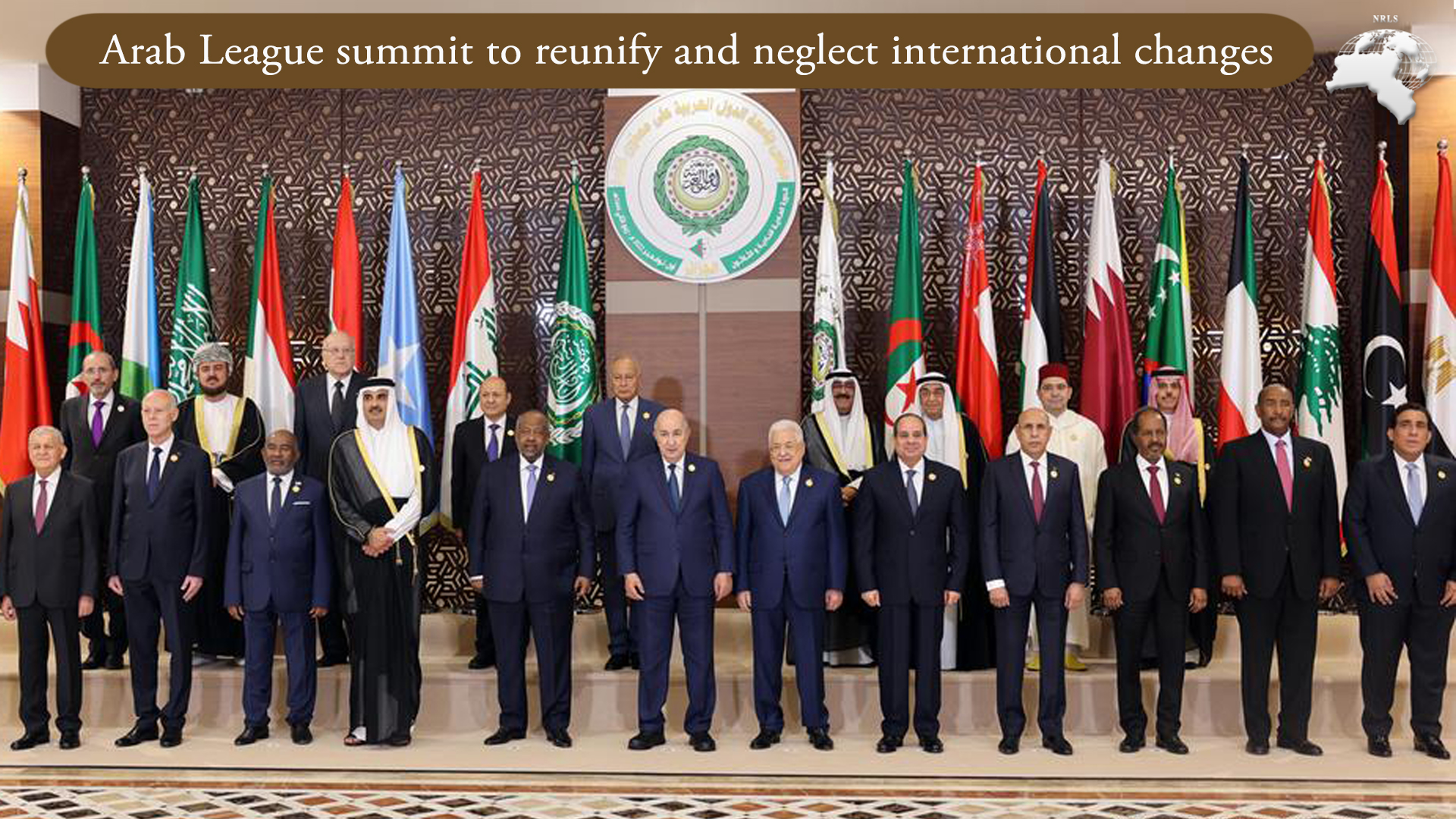Arab League summit to reunify and neglect international changes
Arab League summit to reunify and neglect international changes

Arab countries are still crying over the unity of the Arab ranks and holding international and regional conferences in order to meet their dreams in achieving their unity in light of the stormy internal changes and political transformations that caused coups in most Arab countries due to the so-called Arab Spring in Tunisia, Egypt, Libya, Syria, Iraq and Yemen, which was a disaster for their people and countries as a result of regional interventions.
The regional powers feared that the catastrophe would spread to their countries so that they made a rift in Arab-Arab relations on one hand and in Arab-regional relations on the other, which was not devoid of goals and objectives. Despite the delay of the Arab summit, which was held under the motto “the reunification” in Algeria, it was held in great shyness and different proportions of representation according to the problems and positions of each country and its view of the Arab and international situation and the position of the host country, which is on good relations with Iran and Syria and seeks with all its efforts to represent Syria at the summit despite its non-attendance with Syrian, Algerian, Iranian and perhaps Russian coordination that supported the outcomes of the summit. Despite its weakness and its distance from international data, Algeria tried to unify the Palestinian factions and consider it the central issue of the Arab countries and peoples.
Algeria sought to unify the Arab ranks by not normalizing with Israel and following the previous steps within a framework of Arab nationalist thought, but it failed miserably in this endeavor, as the Saudi King, the President of the United Arab Emirates (UAE), the President of the State of Oman, the Emir of the State of Kuwait and the King of Bahrain were absent from the summit. The summit was attended by the Emir of the State of Qatar, Tamim bin Hamad. This means the consolidation of more political and economic differences between the Arab countries. It also means that the international changes took effect after the Russian-Ukrainian war, especially with regard to the oil and energy crisis, and the attempt by Saudi Arabia and other Gulf states to pursue their interests in a more independent spirit in the dimension. From Western and American trends, and perhaps with hidden Russian encouragement
The summit was attended by the new politically agreed Iraqi president, Egyptian President Abdel-Fattah al-Sisi, and of course the host Algerian president and summit head, who tried to focus on the Palestinian issue as an attempt to bring the Arabs together again around its axis, but he forgot Morocco and the Moroccan king, who in turn did not attend because of the dispute with Algeria over the so-called Saharan Republic and the Polisario Front, in the sense that the Arab summit in Algeria did not achieve the lowest level of Arab coordination due to the political and internal crises of the Arab countries in Syria, Yemen, Lebanon, Iraq and Libya, and the intervention and occupation of Arab lands from the regional countries, such as Iran’s occupation of the UAE islands of the Greater and Lesser Tunbs and Abu Musa, and its blatant interference in the affairs of Iraqi, Yemen, Lebanon and Syria, in addition to Turkey’s manipulation of the tributaries of the rivers that supply Iraq with water, the construction of dams, its blatant interference in the affairs of Arab countries, not to mention its occupation of the Syrian north and its attempt to legitimize its occupation through Turkish national security, the issue of Syrian refugees, the construction of water dams, depriving the population of Syria of its water share and its interference in Libyan internal affairs Dabaiba government support His mandate ends, which the Algeria summit refuses to denounce, and the same thing applies to Ethiopia and the Renaissance Dam, which is the subject of a real dispute with Egypt. Where is the reunification of the Arabs and the Arab countries in this summit that bore this title? Where is the summit’s endeavor to seek Arab economic integration? Where is the Arab common market which has become non-existent and has not been mentioned? If it is mentioned, it will be ashamed and lifted.
Then where are the reforms at the summit of Arab reunification on the Arab League organization which has exceeded seven decades despite the great turning points and the great international changes that occurred in recent decades starting with the first and second Gulf Wars, the occupation of Kuwait, the occupation of Iraq, the fall of totalitarian regimes in many Arab countries and the effects of the Russian-Ukrainian war and its effects on the energy and oil crisis, the food crisis, the import of grain and immigration?
The summit ignored the reform of the Arab League in accordance with all the events and changes that are taking place in the Arab countries. The reunion summit should take ways and means to discuss human rights issues in accordance with the United Nations and international standards, and pay attention to racial and ethnic issues in the Arab countries and in all countries to achieve sustainable security and stability, especially since the Autonomous Administration of North and East Syria (AANES) has sent an appeal to the Arab League to emphasize the unity of the Syrian territories and to seek a solution to the Syrian dilemma.
Finally, the Arab summit in Algeria called reunification was held in complex and exceptional international, regional and Arab circumstances, and for the next summits to succeed, it must be based on new and new structural criteria, taking into account all the obstacles that were mentioned.




